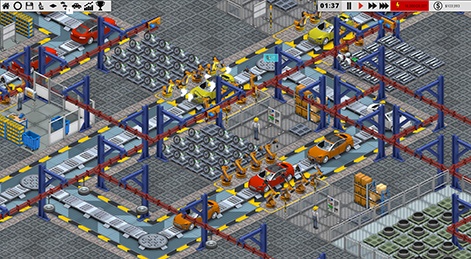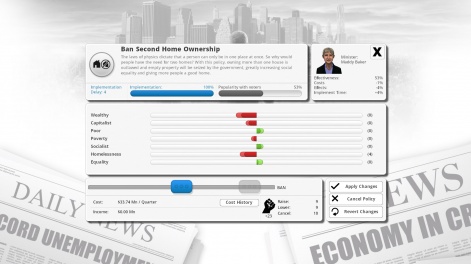A few years ago, indie developer Cliff Harris, with his studio Positech, decided to start publishing games.
The developer was working on hardcore management titles; ones that see users controlling a car factory or a government and so on. This took time, so the publishing arm would keep the lights on and let Harris take his time with this projects.
But that’s now come to a stop; Positech is going to be ramping down its publishing activities.
“It is just me really here,” Harris says.
“Most people in my position would expand and get an office. If I was younger or more obsessed with making money, maybe I'd do that. I like the complete indie freedom, the whiole thing that I can go take a day off if it's sunny or conversely work all evening or whatever. I like the freedom and I guess I haven't got the impressive empire building thing that some indies have. Some of my indie buddies have done the studio thing. But it also seems like a lot of hassle to manage people and admin; you have to have stakeholder pension for people. I don't want to have to deal with that. That's more corporate and not indie I think. I'll probably keep things as they are right now.”
Right now, Positech’s big project is Production Line, a game that sees players put in charge of a car factory. By his own admission, this ties into Harris’ own obsession with optimisation.
“I've realised that you have to make the game that you want,” Harris explains.
“I don't care if it's a success or not; obviously I want it to be a success and I enjoy playing it, but when I completely switch off caring about what the sales are like and everything, I really do like working on it. I did get addicted to Factorio at one point briefly, and I like that, but I don't like the setting and the fact that money isn't involved. I like there to be a business side of things. Strangely I became really interested in cars and how they are made. Essentially, the whole thing is making a game out of something that I enjoy which is optimising. I love optimising programming, so production line is the gamified version of what I do when I'm optimising code. I really enjoy working on this.”

The title has also changed the developer’s opinions on Early Access; once someone who disliked it, he has now released Production Line into it and this has proven to yield useful information.
“I like the crowdsourcing of ideas really,” Harris says.
“I posted a thing earlier this year about some changes to research works in Production Line. There are all these comments and they were coming in via the blog and Steam and so on. I have no idea if these people have played the game for 100 hours, but there are some really good ideas there and it's quite interesting.
"Sometimes developers have really bad ideas and if you are on an indie team of like three or four people, when you have a stupid idea someone will tell you, but I don't have that as it's just me. For quite a while at the start of Production Line, when it was set in Henry Ford's time, I was going to make everyone working in the factory cats with little hats and hammers and everything making car. I thought that would be cool. Then some friends told me that would be stupid. Now I look back and see it was a really weird thing that I thought I'd do.
"The thing with Early Access is that the moment you pipe up with an idea like that, you have a load of people who bought the game and are playing it saying it's stupid. I find it really helpful. I quite like the direct contact when it comes to priorities. I have this thing where people can vote from the main menu and there's loads of stuff I would have done that I've just ignored because nobody has voted for it. For example, there's about ten sound effects in the game and they're all stock bought for like $10. Every few weeks I put in the list of priorities about making the sound effects better and it's just tumbleweeds – nobody cares. I think 'fine', why waste time on that when people would rather have this other feature. It's a collaborative bit of design and I quite like that. I'd still not do a Kickstarter but I do like Early Access. I have seen the light.”
So why doesn't Harris like Kickstarter?
“I don't like the idea that you can buy influence on the way a game is made or designed, which Kickstarter does where people go: 'pay this money and you can come out for a meal with the developers’,” he says.
“The stretch goals. All of that stuff still freaks me out. I think it's slightly morally wrong, really. It's like saying: 'the most interesting ideas will come from the wealthiest players' which is just not my experience. It's amazing; can you imagine penning the Mona Lisa and then someone saying: 'I'll go in on this tier with 10k ducats but make her smile'. I don't like that.”

Harris’ other big project this year has been Democracy 3. This game has proven to be a challenge to Positech as it tries to take them across to China, Japan and the UAE. Why? Because the game is coded in ASCII which doesn’t make life easy for localising into those languages. So the project has had to be entirely redone in Unicode for this reason; but it should be worth it.
“Apart from the humour from a PR point of view and sales and saying we have brought Democracy to China, I actually think it is a worthwhile game to have in the hands of as many people as possible,” Harris says.
“Increasingly the majority of people on the internet now are in China. It is a big successful game so I can justify doing it, and as Jeff Sheen [from Stargazy Studios, who made the Democracy 3 Africa expansion] is making it in Unicode, it makes it easier for me to do a port of Production Line to Unicode and so on. It is a load of hassle. It's a surprising amount of hassle to support non-Western languages in games. I guess most people don't know that because most people use Unity and it's probably built in.”
Harris’ focus right now is on Production Line, with plans to produce extra content if the demand is there.
“Because I'm trying to get into this mindset of someone happily developing a game for a long period, I'd like to think I'm still working on Production Line in a year,” he says.
“If I make reasonably money off it, I do wonder whether I have to do DLC or whether I can keep working on it. My model for this is Prison Architect. I think they did really well there. They could have shipped the game earlier, they could have done sequels and DLC and so on. But they kept going and kept expanding on the sort of concept because it was so popular and well-received. I hope to still be working on this game and just making it better and probably not publishing anything else because I think that will let me make a game that I'm really, really happy with. I've stressed myself and stretched myself too thin in the past and I don't want to do that again. Hopefully no change, really. That's not very exciting or newsworthy.
“The other thing is we will be doing Democracy 4. But I won't be coding it; Jeff will do that. And we're going to take our time with that and it'll be worthy of being a proper sequel and everything. It's in the planning stage. We're just waiting to get this Chinese stuff done first. The stuff we've done to be able to do Chinese text has been useful for the UI, too. I'm doing quite well with the games thing so I don't want to rock the boat. I don't want anything to change. That's my aim.”













